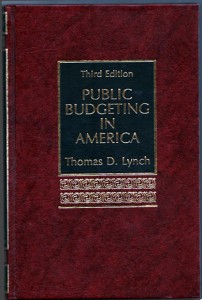Public Budgeting in America Third Edition
Public Budgeting in America Third Edition
Library of Congress Cataloging-in-Public Data
Lynch, Thomas Dexter
Public budgeting in America/Thomas D. Lynch.-3rd ed.
p. cm.
Includes bibliographies and index.
1. Budget-United States. I. Title
HJ2051.L93 1990
350.72’2’0973-dc19 89-31174
ISBN: 0-13-737388-0
© 1990, 1985, 1979 by Prentice-Hall, Inc.
A Division of Simon & Schuster
Englewook Cliffs, New Jersey 07632
All rights reserved. No part of this book may be reproduces, in any form or by any means, without permission in writing from the publisher.
Printed in United states of America.
PREFACE
This edition is primarily an update of the second edition. The major changes are associated with computer technology, debt management, an improving professional literature, and professional development. The microcomputer is clearly making a difference in budgeting and financial management, and in this edition, I explain its increasingly important role. One subject that needed updating was debt management.The Reagan years brought significant changes in debt management by first opening the Pandora’s box of creative financing to government debt managers, and then closing the box due to federal treasury losses. The second edition reflected the first set of changes; this edition reflects the later reforms.
In reflecting on the changes, I believe that most were prompted by remarkable developments in the profession, but that some were prompted by my desire to communicate this complex body of knowledge in a more intelligible manner. Such areas as forecasting and capital budgeting have undergone remarkable changes in recent years. I am still amazed at the rate of change and the increasing sophistication of the subject matter as it evolves. Professional change is not only represent but growing. The Government Finance Officer Association (GFOA) is continuing to produce fine additions to the practical literature on budgeting and financial management. However, its most significant recent contribution to the field is its new yearly budget award process. This process is defensing “good budgeting” and serving as an incentive to many local governments to prepare “good budgets.” In addition, journals like Public Budgeting and Finance and the new Public Budgeting and financial Management are producing a steady flow or articles that enhance the professional understanding of our field.
I must acknowledge my appreciation to everyone who has contributed to this edition. I wish to thank the reviewers for their helpful suggestions: Khi V. Thai, University of Maine, and Grace Hall Saltzstein, University of California-Riverside.
Thomas D. Lynch
Boca Raton, Florida
